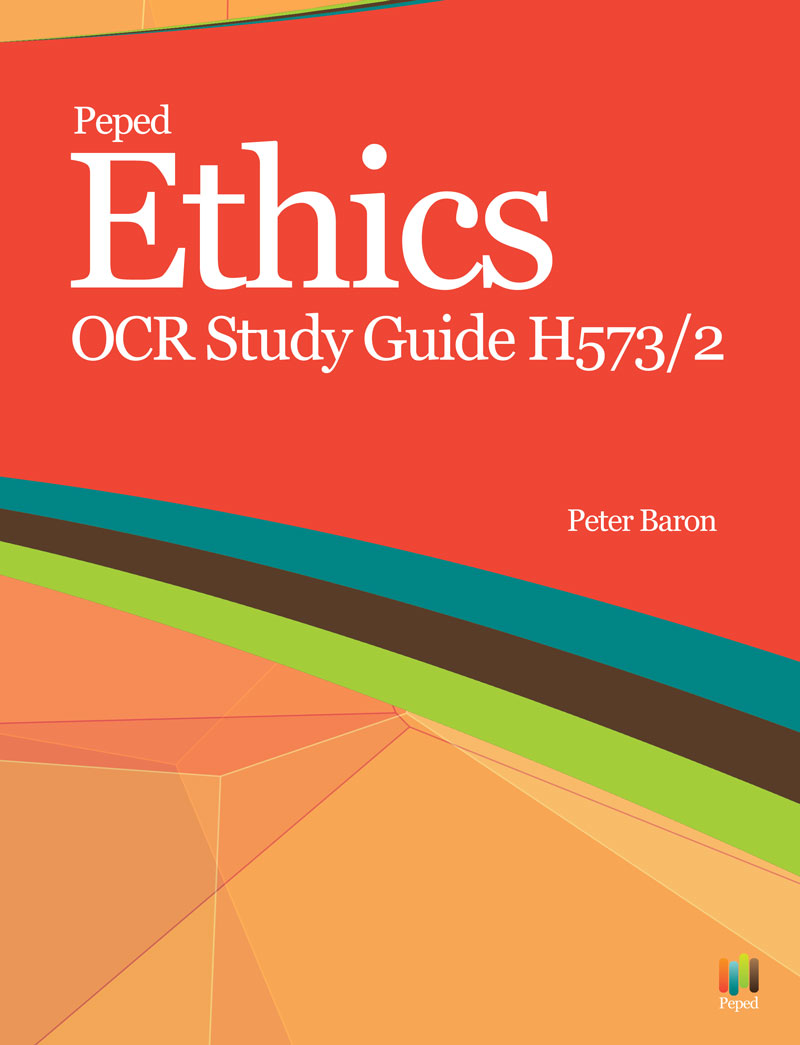Front cover
Ethics OCR Study Guide H573 / 2
The Ethics Study Guide is designed to help GCE A level students ask the right questions by unpacking key theories and applications according to structures of thought, and by doing the exercises, to build essay-writing skills step by step.
By analysing assumptions and worldviews, and making principles crystal clear, the student is able to build an ethics toolkit which can help answer questions on any applied issue.
Business ethics, euthanasia and sexual ethics are considered as applied issues, including discussions on how the major ethical theories of Kant, The utilitarians Bentham and Mill, Fletcher’s situation ethics, and Aquinas’ natural law theory.
Detailed evaluation helps build the critical sense and the book comes with its own website of additional material, peped.org.
An essential book for those who wish to be liberated to think philosophically, with rigour and flexibility.
£9.99
Product details
Format: Softcover Book
Size: 8.5″ x 11″ (21.59 x 27.94 cm)
Paper: Black & White on White paper
Pages: 126
ISBN-13: 9781983148989
For bulk orders over 30 items please contact sales@peped.org directly
Full Contents Breakdown
Table of Contents
- Purpose of the Book
- What is Ethics?
- The Meaning of the Word
- Derivation of Norms (D)
- Application of the Norm (A)
- Realism (R) and What it Means to be HumanMotivation (M)
- Meta-ethics (Beyond Ethics)
- Essay-writing Skill
- Deontological & Teleological
- The Meaning of Deon and Telos
- Rules – Hard or Soft?
- A Teleological Aspect to all Ethical Theories
- Judgement is Involved in all Theories
- Situation Ethics – Teleological Ethics
- What does the Cartoon Suggest?
- Fundamental Good – Agape
- Antinomianism and Legalism
- How Relativistic?
- Four Working Principles
- The Place of Conscience
- Six Fundamental Principles
- The Means/Ends Problem in Ethics
- Hard Cases in Ethics
- Thought Points
- Some Confusions to Avoid
- Essay-writing
- Bentham’s Act Utilitarianism – Teleological Ethics
- One Intrinsic Good
- Bentham’s Structure of Thought
- Pleasure is Quantitive
- An Empirical Philosophy
- Thought-points
- The Pleasure Machine
- Essay-writing Skill
- Evaluation Points on Bentham
- Afterword
Contents continued
- Mill’s Weak Rule Utilitarianism -Teleological Ethics
- J.O. Urmson (1952)
- Mill’s Structure of Thought
- Important Points
- Mill’s Analogy of the Navigator
- Higher and Lower Pleasures
- Justice
- Williams’ Integrity Objection
- Some Quotes to Consider
- Essay-writing Skill: the Five Paragraph Structure
- Natural Law – Deontological Ethics
- Background
- Natural Law
- Deontological Diamond
- Ratio and the Eternal Law
- Teleological Map of Natural Law
- Synderesis is the Starting Point
- Primary Precepts
- Acronym POWER
- Natural Law & Veritatis Splendor (1995)
- Human Reason is Crucial
- Motive is Important
- When Two Goods Conflict
- Problem of Hierarchies in Natural Law
- Problem of Selfish Egoism
- Essay-writing Skill
- Deontological Ethics – Kant
- Deontological and Absolute
- Structure of Thought
- Based on Motive and the ‘Good Will’
- Categorical, not Hypothetical
- Two Versions of the Categorical Imperative (learn these exactly)
- The Three Postulates
- Thought Points
- Deontological or Teleological?
- Evaluating Kant
- Essay-writing Skills
Contents continued
- Euthanasia (Applied to Natural Law and Situation Ethics)
- Issues
- Situation Ethics and Euthanasia
- Problems with Situation Ethics
- Starmer Guidelines (2010)
- Oregon Rules (1997)
- Slippery Slope Arguments
- Integrity Problem
- A Doctor’s View
- Autonomy and Consent
- Sanctity of Life and Natural Law Precepts
- Religious Origins of the Sanctity of Life
- Secular Arguments for Sanctity of Life
- Quality of Life
- Acts and Omissions
- Principle of Double Effect
- Essay-writing
- Business Ethics (Applied to Kant and Utilitarianism)
- Key Issues
- Is Milton Friedman Right?
- Problem – Ethics or Economics?
- Kant’s Approach
- Three Case Studies On Business Ethics
- Conclusions
- Essay-writing
- Meta-ethics
- Three Issues in Meta-ethics
- Three Terms & Three Applications
- Specification
- Structure of Thought
- The Debate about Moral Facts
- David Hume’s Missing Premise Argument
- The Naturalistic Fallacy
- Problems with Moore’s Intuitionist View
- Defences of Naturalism
- Open Question Attack
- The Analytic/Synthetic Divide
- Emotivism
- MacIntyre’s Attack On Emotivism
- Further Problems with Ayer’s View
- John Searle’s Naturalistic Argument from the Idea of Language-Games
- Naturalism and Absolutism
- Emotivism and Relativism
- Essay-writing Skill
Contents continued
- Conscience
- Four Potential Sources of Conscience
- Aquinas (Innate and Reasonable)
- Application to Sexual Desire
- Vincible and Invincible Ignorance
- Freud – Conscience in Conflict
- The Bad Conscience
- Essay-writing
- Sexual Ethics
- Issues in Sexual Ethics
- Varieties of Sexual Expression
- Four Models of Sexual Ethics
- 1. Pleasure Model
- 2. Teleological Fulfilment and Spiritual Unity Model
- 3. Communication Model
- 4. Duty Model
- Roman Catholic uses of Natural Law – a Design Argument (Teleological)
- Evaluation of Humanae Vitae 1968
- Issues in Human Sexuality (Church of England 2003)
- Think About
- The Bible Seems to Mention Four Aspects of Sex
- A Sexual Bill of Rights
- Sexual Responsibilities
- Essay-writing Practice
- Activity – Research a Debate
- Revisiting the DARM Approach







